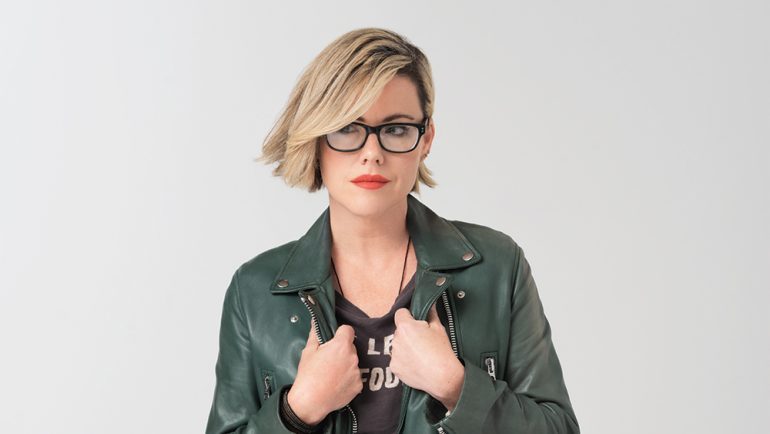Kathleen Robertson on Similarities Between Acting and Writing: ‘You Have to Nail the Voice’
By Danielle Turchiano
LOS ANGELES (Variety.com) – Kathleen Robertson has been acting for more than three decades, most recently spending three years on TNT’s “Murder in the First” and just completing “Northern Rescue,” which is due to drop on Netflix early next year. But she is also working behind-the-scenes as a writer, adapting novels such as “The Possibilities” and “Little Bee,” as well as Dark Horse’s “Lady Killer” comics into feature films and developing additional projects for TV through a deal with Universal Cable Productions.
When did you first start writing?
I was always a closet writer. I was the person who would write short stories and scripts and throw them in a drawer and not let anyone see them — for years. Technically I started writing when I was 10, journaling and short stories. And then over the years when I would be away on location and have a ridiculous amount of downtime, I started taking it to the next level in terms of optioning some books and one day I decided to actually start letting people read some of it. But at the beginning when I really started to write I was very much writing in a bubble. I wasn’t writing it to sell it, I wasn’t writing it to fit what is this moment in time [or] what people are looking for or is hot. I was just writing what I was interested in, and that’s what I really try to stay true to now that I’m a writer for hire. I won’t say yes to anything that I am not personally like, “This is something I’d totally want to watch.”
When was the moment you were OK with people finally reading it?
My husband, Chris Cowles, is a producer and he always would say I was a really good writer — “You’re a real writer, you’re not an actor that wants to be a writer.” And I’d been acting forever, and I got this acting job on “Boss,” and the writing was so exquisite — it was so incredible — and it was in that period where I went, “This excites me and moves me so much more than just being an actor. I’m going to put this out there in the universe and see what happens.”
How do you feel your acting background aids your writing?
Most writers aren’t actors, so they don’t know how to write for actors, so I think that’s part of why people are coming to me. I know how to write for Julia Roberts — I know what Julia Roberts is going to want — because I know how to approach things from character and make a scene that’s flat and expositional feel alive and give the actor something to do. … The tricky part about adaptations is it’s all about nailing the voice, and with all three of those pieces of source material, the voices are very different, so it’s almost, weirdly, like acting because you have to channel that voice. It’s not me, it’s the voice of that piece.
You are still juggling acting with writing. What is most important to you about the roles you take today?
It has to be able to fit into the writing’s world. I couldn’t do No. 1 on the call sheet, network, 22 episodes — that’s not an option, not even something I would consider. Location is important, but it’s hard because not a ton of stuff shoots in LA. It also has to be something that feels fun to me and feels like a challenge. It has to be value added, it can’t just be a job.
And from a character perspective, are there certain things you specifically want or want to avoid at this point in your career?
When I was younger I would always try to fight against my natural resting state in terms of the roles that I would get, but now I’ve kind of surrendered to the fact that the roles I get are always strong women. I’m always no-nonsense, tough, direct — I am frequently cast in roles that were written for men, but they’re going to make it a woman, and when I was younger I wanted to play all kinds of things, but now I get it. I have a very deep voice and a very strong vibe. I’m not going to get the wide-eyed, innocent [roles]. I’m OK with it.
Do you ever feel like you should just write for yourself?
I don’t really write for myself. I’ve always been hyper-aware of the perception of what it is to be an actor trying to do something else, whether it’s directing or writing or anything. So, especially in the beginning, I wanted to keep it separate. … I was rewatching “Fleabag” the other night, which I love, and “The OA” with what Brit Marling is doing. I see other women doing it, and I’m fascinated by it. I just haven’t gotten there yet. I will, I suppose, maybe, but it’s not my priority for some weird reason. Not yet. I want to get enough stuff going that isn’t about “Look at me” as an actor, and I really want to be able to focus on the writing and not be thinking about acting.
What advice do you have for those who want to start writing for film or television today?
I honestly think that it’s that thing of you have to have something to say. It sounds so cliche, but literally that’s all it is. … You have to see the world in a way that is specific to you and be able to put that into your work, and people respond to that.

